Chengwei Qin
Learning Query-Aware Budget-Tier Routing for Runtime Agent Memory
Feb 05, 2026Abstract:Memory is increasingly central to Large Language Model (LLM) agents operating beyond a single context window, yet most existing systems rely on offline, query-agnostic memory construction that can be inefficient and may discard query-critical information. Although runtime memory utilization is a natural alternative, prior work often incurs substantial overhead and offers limited explicit control over the performance-cost trade-off. In this work, we present \textbf{BudgetMem}, a runtime agent memory framework for explicit, query-aware performance-cost control. BudgetMem structures memory processing as a set of memory modules, each offered in three budget tiers (i.e., \textsc{Low}/\textsc{Mid}/\textsc{High}). A lightweight router performs budget-tier routing across modules to balance task performance and memory construction cost, which is implemented as a compact neural policy trained with reinforcement learning. Using BudgetMem as a unified testbed, we study three complementary strategies for realizing budget tiers: implementation (method complexity), reasoning (inference behavior), and capacity (module model size). Across LoCoMo, LongMemEval, and HotpotQA, BudgetMem surpasses strong baselines when performance is prioritized (i.e., high-budget setting), and delivers better accuracy-cost frontiers under tighter budgets. Moreover, our analysis disentangles the strengths and weaknesses of different tiering strategies, clarifying when each axis delivers the most favorable trade-offs under varying budget regimes.
Training Multi-Turn Search Agent via Contrastive Dynamic Branch Sampling
Feb 03, 2026Abstract:Agentic reinforcement learning has enabled large language models to perform complex multi-turn planning and tool use. However, learning in long-horizon settings remains challenging due to sparse, trajectory-level outcome rewards. While prior tree-based methods attempt to mitigate this issue, they often suffer from high variance and computational inefficiency. Through empirical analysis of search agents, We identify a common pattern: performance diverges mainly due to decisions near the tail. Motivated by this observation, we propose Branching Relative Policy Optimization (BranPO), a value-free method that provides step-level contrastive supervision without dense rewards. BranPO truncates trajectories near the tail and resamples alternative continuations to construct contrastive suffixes over shared prefixes, reducing credit ambiguity in long-horizon rollouts. To further boost efficiency and stabilize training, we introduce difficulty-aware branch sampling to adapt branching frequency across tasks, and redundant step masking to suppress uninformative actions. Extensive experiments on various question answering benchmarks demonstrate that BranPO consistently outperforms strong baselines, achieving significant accuracy gains on long-horizon tasks without increasing the overall training budget. Our code is available at \href{https://github.com/YubaoZhao/BranPO}{code}.
AMA: Adaptive Memory via Multi-Agent Collaboration
Jan 28, 2026Abstract:The rapid evolution of Large Language Model (LLM) agents has necessitated robust memory systems to support cohesive long-term interaction and complex reasoning. Benefiting from the strong capabilities of LLMs, recent research focus has shifted from simple context extension to the development of dedicated agentic memory systems. However, existing approaches typically rely on rigid retrieval granularity, accumulation-heavy maintenance strategies, and coarse-grained update mechanisms. These design choices create a persistent mismatch between stored information and task-specific reasoning demands, while leading to the unchecked accumulation of logical inconsistencies over time. To address these challenges, we propose Adaptive Memory via Multi-Agent Collaboration (AMA), a novel framework that leverages coordinated agents to manage memory across multiple granularities. AMA employs a hierarchical memory design that dynamically aligns retrieval granularity with task complexity. Specifically, the Constructor and Retriever jointly enable multi-granularity memory construction and adaptive query routing. The Judge verifies the relevance and consistency of retrieved content, triggering iterative retrieval when evidence is insufficient or invoking the Refresher upon detecting logical conflicts. The Refresher then enforces memory consistency by performing targeted updates or removing outdated entries. Extensive experiments on challenging long-context benchmarks show that AMA significantly outperforms state-of-the-art baselines while reducing token consumption by approximately 80% compared to full-context methods, demonstrating its effectiveness in maintaining retrieval precision and long-term memory consistency.
Watching, Reasoning, and Searching: A Video Deep Research Benchmark on Open Web for Agentic Video Reasoning
Jan 11, 2026Abstract:In real-world video question answering scenarios, videos often provide only localized visual cues, while verifiable answers are distributed across the open web; models therefore need to jointly perform cross-frame clue extraction, iterative retrieval, and multi-hop reasoning-based verification. To bridge this gap, we construct the first video deep research benchmark, VideoDR. VideoDR centers on video-conditioned open-domain video question answering, requiring cross-frame visual anchor extraction, interactive web retrieval, and multi-hop reasoning over joint video-web evidence; through rigorous human annotation and quality control, we obtain high-quality video deep research samples spanning six semantic domains. We evaluate multiple closed-source and open-source multimodal large language models under both the Workflow and Agentic paradigms, and the results show that Agentic is not consistently superior to Workflow: its gains depend on a model's ability to maintain the initial video anchors over long retrieval chains. Further analysis indicates that goal drift and long-horizon consistency are the core bottlenecks. In sum, VideoDR provides a systematic benchmark for studying video agents in open-web settings and reveals the key challenges for next-generation video deep research agents.
Task-Adaptive Parameter-Efficient Fine-Tuning for Weather Foundation Models
Sep 26, 2025Abstract:While recent advances in machine learning have equipped Weather Foundation Models (WFMs) with substantial generalization capabilities across diverse downstream tasks, the escalating computational requirements associated with their expanding scale increasingly hinder practical deployment. Current Parameter-Efficient Fine-Tuning (PEFT) methods, designed for vision or language tasks, fail to address the unique challenges of weather downstream tasks, such as variable heterogeneity, resolution diversity, and spatiotemporal coverage variations, leading to suboptimal performance when applied to WFMs. To bridge this gap, we introduce WeatherPEFT, a novel PEFT framework for WFMs incorporating two synergistic innovations. First, during the forward pass, Task-Adaptive Dynamic Prompting (TADP) dynamically injects the embedding weights within the encoder to the input tokens of the pre-trained backbone via internal and external pattern extraction, enabling context-aware feature recalibration for specific downstream tasks. Furthermore, during backpropagation, Stochastic Fisher-Guided Adaptive Selection (SFAS) not only leverages Fisher information to identify and update the most task-critical parameters, thereby preserving invariant pre-trained knowledge, but also introduces randomness to stabilize the selection. We demonstrate the effectiveness and efficiency of WeatherPEFT on three downstream tasks, where existing PEFT methods show significant gaps versus Full-Tuning, and WeatherPEFT achieves performance parity with Full-Tuning using fewer trainable parameters. The code of this work will be released.
RIMO: An Easy-to-Evaluate, Hard-to-Solve Olympiad Benchmark for Advanced Mathematical Reasoning
Sep 09, 2025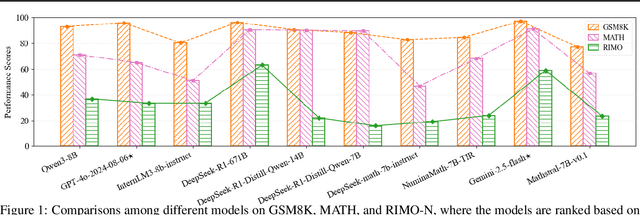
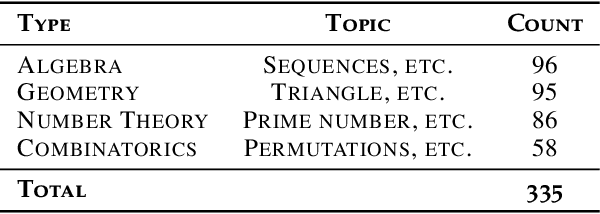
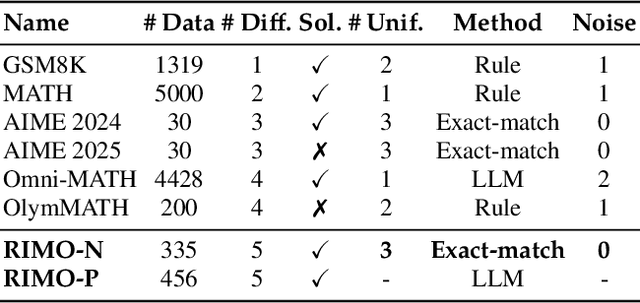

Abstract:As large language models (LLMs) reach high scores on established mathematical benchmarks, such as GSM8K and MATH, the research community has turned to International Mathematical Olympiad (IMO) problems to push the evaluation frontier. However, existing Olympiad-level benchmarks suffer from practical constraints that introduce grading noise and potential bias, such as heterogeneous answer formats requiring model-based judges and a reliance on potentially flawed solutions. We introduce RIMO, a two-track benchmark designed to preserve peak Olympiad difficulty while eliminating this evaluation noise. The first track, RIMO-N, rewrites 335 IMO problems to admit a single, unique integer answer, allowing for deterministic correctness checking. The second track, RIMO-P, features 456 proof problems with expert-checked solutions, which are decomposed into a sequence of sub-problems to evaluate the step-by-step reasoning process via an automated grading system. Our benchmarking of ten frontier LLMs, including GPT-4o and Gemini 2.5 Flash, reveals that while these systems excel on older benchmarks, their performance drops sharply on RIMO. These results highlight a substantial gap between current LLM capabilities and actual Olympiad-level reasoning. By providing a challenging yet easy-to-evaluate suite, RIMO offers a high-resolution yardstick for future research, presenting a clear target for closing the profound reasoning gap our findings expose.
DRQA: Dynamic Reasoning Quota Allocation for Controlling Overthinking in Reasoning Large Language Models
Aug 25, 2025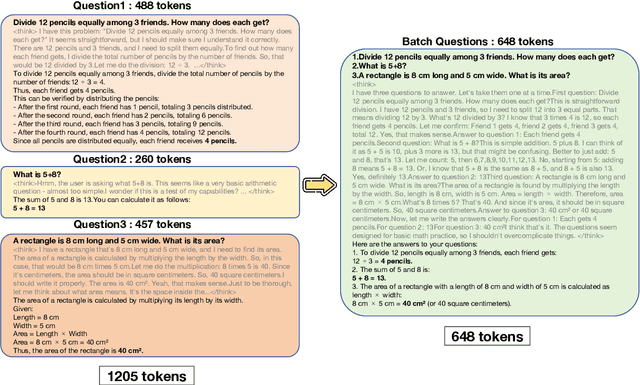
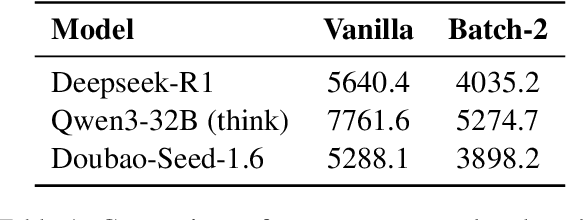
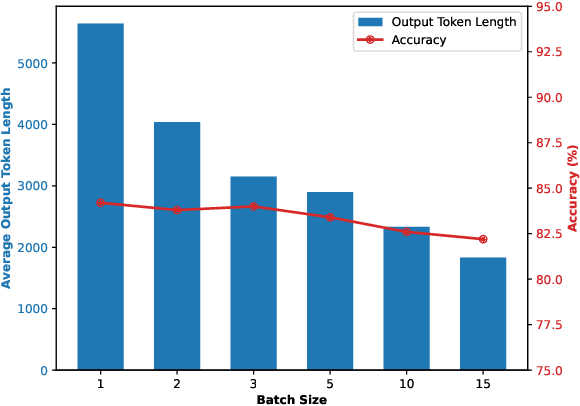

Abstract:Reasoning large language models (RLLMs), such as OpenAI-O3 and DeepSeek-R1, have recently demonstrated remarkable capabilities by performing structured and multi-step reasoning. However, recent studies reveal that RLLMs often suffer from overthinking, i.e., producing unnecessarily lengthy reasoning chains even for simple questions, leading to excessive token consumption and computational inefficiency. Interestingly, we observe that when processing multiple questions in batch mode, RLLMs exhibit more resource-efficient behavior by dynamically compressing reasoning steps for easier problems, due to implicit resource competition. Inspired by this, we propose Dynamic Reasoning Quota Allocation (DRQA), a novel method that transfers the benefits of resource competition from batch processing to single-question inference. Specifically, DRQA leverages batch-generated preference data and reinforcement learning to train the model to allocate reasoning resources adaptively. By encouraging the model to internalize a preference for responses that are both accurate and concise, DRQA enables it to generate concise answers for simple questions while retaining sufficient reasoning depth for more challenging ones. Extensive experiments on a wide range of mathematical and scientific reasoning benchmarks demonstrate that DRQA significantly reduces token usage while maintaining, and in many cases improving, answer accuracy. By effectively mitigating the overthinking problem, DRQA offers a promising direction for more efficient and scalable deployment of RLLMs, and we hope it inspires further exploration into fine-grained control of reasoning behaviors.
Learning Auxiliary Tasks Improves Reference-Free Hallucination Detection in Open-Domain Long-Form Generation
May 18, 2025Abstract:Hallucination, the generation of factually incorrect information, remains a significant challenge for large language models (LLMs), especially in open-domain long-form generation. Existing approaches for detecting hallucination in long-form tasks either focus on limited domains or rely heavily on external fact-checking tools, which may not always be available. In this work, we systematically investigate reference-free hallucination detection in open-domain long-form responses. Our findings reveal that internal states (e.g., model's output probability and entropy) alone are insufficient for reliably (i.e., better than random guessing) distinguishing between factual and hallucinated content. To enhance detection, we explore various existing approaches, including prompting-based methods, probing, and fine-tuning, with fine-tuning proving the most effective. To further improve the accuracy, we introduce a new paradigm, named RATE-FT, that augments fine-tuning with an auxiliary task for the model to jointly learn with the main task of hallucination detection. With extensive experiments and analysis using a variety of model families & datasets, we demonstrate the effectiveness and generalizability of our method, e.g., +3% over general fine-tuning methods on LongFact.
A Survey of Frontiers in LLM Reasoning: Inference Scaling, Learning to Reason, and Agentic Systems
Apr 12, 2025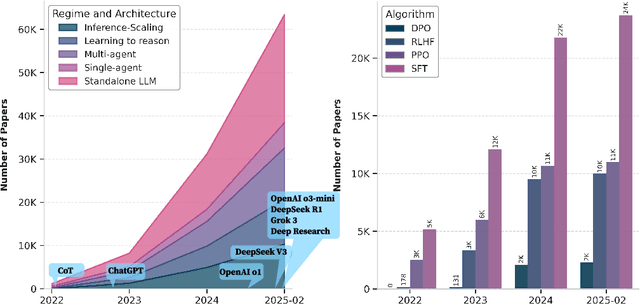



Abstract:Reasoning is a fundamental cognitive process that enables logical inference, problem-solving, and decision-making. With the rapid advancement of large language models (LLMs), reasoning has emerged as a key capability that distinguishes advanced AI systems from conventional models that empower chatbots. In this survey, we categorize existing methods along two orthogonal dimensions: (1) Regimes, which define the stage at which reasoning is achieved (either at inference time or through dedicated training); and (2) Architectures, which determine the components involved in the reasoning process, distinguishing between standalone LLMs and agentic compound systems that incorporate external tools, and multi-agent collaborations. Within each dimension, we analyze two key perspectives: (1) Input level, which focuses on techniques that construct high-quality prompts that the LLM condition on; and (2) Output level, which methods that refine multiple sampled candidates to enhance reasoning quality. This categorization provides a systematic understanding of the evolving landscape of LLM reasoning, highlighting emerging trends such as the shift from inference-scaling to learning-to-reason (e.g., DeepSeek-R1), and the transition to agentic workflows (e.g., OpenAI Deep Research, Manus Agent). Additionally, we cover a broad spectrum of learning algorithms, from supervised fine-tuning to reinforcement learning such as PPO and GRPO, and the training of reasoners and verifiers. We also examine key designs of agentic workflows, from established patterns like generator-evaluator and LLM debate to recent innovations. ...
Unicorn: Text-Only Data Synthesis for Vision Language Model Training
Mar 28, 2025Abstract:Training vision-language models (VLMs) typically requires large-scale, high-quality image-text pairs, but collecting or synthesizing such data is costly. In contrast, text data is abundant and inexpensive, prompting the question: can high-quality multimodal training data be synthesized purely from text? To tackle this, we propose a cross-integrated three-stage multimodal data synthesis framework, which generates two datasets: Unicorn-1.2M and Unicorn-471K-Instruction. In Stage 1: Diverse Caption Data Synthesis, we construct 1.2M semantically diverse high-quality captions by expanding sparse caption seeds using large language models (LLMs). In Stage 2: Instruction-Tuning Data Generation, we further process 471K captions into multi-turn instruction-tuning tasks to support complex reasoning. Finally, in Stage 3: Modality Representation Transfer, these textual captions representations are transformed into visual representations, resulting in diverse synthetic image representations. This three-stage process enables us to construct Unicorn-1.2M for pretraining and Unicorn-471K-Instruction for instruction-tuning, without relying on real images. By eliminating the dependency on real images while maintaining data quality and diversity, our framework offers a cost-effective and scalable solution for VLMs training. Code is available at https://github.com/Yu-xm/Unicorn.git.
 Add to Chrome
Add to Chrome Add to Firefox
Add to Firefox Add to Edge
Add to Edge